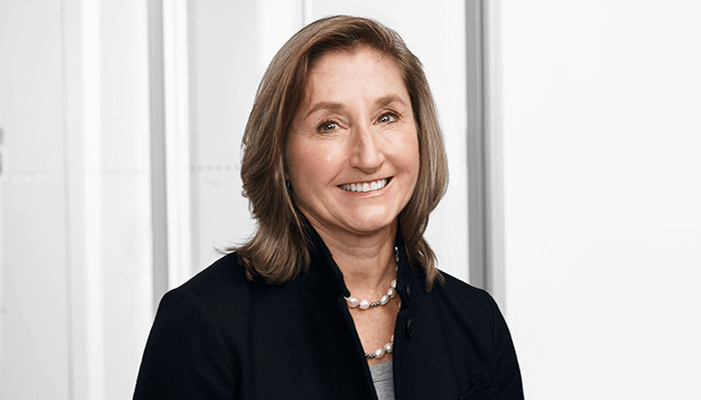
Barbara M. Wirostko wears many hats – she is a board-certified ophthalmologist; resident research director at John A. Moran Eye Institute’s and adjunct professor of ophthalmology and biomedical engineering at the University of Utah, Salt Lake City, USA; and a fellow of ARVO. She is also chief medical officer and founder of Qlaris Bio. Here, we place Wirostko in the limelight!
It’s fair to say you keep yourself busy…
Yes! I consider myself to be a clinician-researcher – a glaucoma specialist – but have also found myself working in industry and entrepreneurship. I love being at the forefront of discovery, whether it’s helping patients, students, early clinicians, or investigators.
My industrial associations started with working one day a week at Pfizer – I eventually ended up working there full time for five years in medical and clinical development. But although I loved Pfizer’s cutting-edge research, I really missed seeing patients. After moving out to Park City, Utah, I was invited to join John A. Moran Eye Institute as an adjunct professor, which allowed me to balance seeing patients and working in industry before becoming a clinician-researcher and entrepreneur.
Today, I see patients in my clinic in Park City and I work at the Veterans Health Administration hospital, where – aside from treating veterans – I also teach medical students, residents, and fellows. There’s nothing more rewarding than giving back to those who have given so much for our country. It’s also a joy to help young researchers, medical students, undergraduates, and fellows to realize their potential.
Wearing my entrepreneurial hat, I’ve started several companies – one such company is MyEYES: we enable patients access to a home IOP tonometer to better determine IOP spikes in order to gauge a more accurate depiction of glaucoma status. My most recent biotech company is Qlaris Bio, which I co-founded with Thurein Htoo, a colleague from Pfizer; we raised US$25 million through a Series A funding round August 2019.
What does ARVO membership look like for you?
Over the years, I’ve been involved with members, the training committee, and educational mentoring programs and the ARVO staff. I was also involved in the ARVO global mentoring program, and I’m still a mentor for up-and-coming young researchers and clinicians. I think I bring a unique perspective on how to develop as a leader, clinician, and researcher.
When I was a youngster, I went to ARVO meetings in Sarasota, Florida, with my dad, Emil Wirostko, who was a uveitis specialist at Columbia University. He would go to a meeting, come back for lunch, and then go back to the meeting. After the conference finished, he’d play with us on the beach. Now, my brother, William Wirostko and I are both ARVO members! My dad has had a big influence on us and our relationship with ARVO. “ARVO” is a common household word for us.
I began getting involved with ARVO as a young resident in ophthalmology, and I have felt valued within the community ever since. Making members feel they are contributing to the betterment of ophthalmic research and part of a network is an area where ARVO really thrives.
How does the field of ophthalmology benefit from ARVO?
I love that ARVO has clinicians, basic science researchers, engineers, and industry leaders at the same meeting. We can’t move science forward in a vacuum, and ARVO does a great job of pulling in different disciplines, including the FDA and regulatory agents, pharmacologists, toxicologists, and more – it’s just a great meeting of minds. So many of our medications in ophthalmology came from beyond the eye: i.e., cardiovascular, oncology, infectious disease, and this wouldn’t happen without interdisciplinary work.
Do your varied roles make you a better ophthalmologist?
Not confining my work to the clinic has definitely made me a better ophthalmologist. There are many things that I have learned that aren’t taught in medical school, such as understanding drug development, clinical studies, and FDA regulatory processes. Something I have tried to instill at ARVO, especially for members in training who are interested in becoming entrepreneurs, is the knowledge of how to turn an idea into reality – and that includes being careful not to publish novel findings too early so that you don’t ruin your chance of raising money for an idea because there’s no intellectual property. This philosophy obviously goes against the academic publishing mindset but can be crucial to the success of any venture in the early stages. Entrepreneurial thinking is where ophthalmologists could do a much better job. Engineering programs are fantastic at teaching their students how to progress an idea, but the routes to commercialization in medicine are generally poorly understood and generally not taught.
What was your first ever project?
My first ever project was working with my father, where he was researching the mycoplasma-like organisms that were potentially causing inflammation. I was 16 years old and in high school, and I wanted to get a job to make some money. I told my dad that I was going to apply for a job at Dunkin’ Donuts, but he said, “No, you’re not. You’re going to come and work in the lab and learn electron microscopy.” So, I worked in the lab and learned electron microscopy. And I started to publish papers. At the time, I had no idea how valuable that was – but, looking back, it was life-changing. Pursuing a career in medicine has become so competitive that I tell my students they must do research and publish.
My initial work with ARVO also involved my dad. In 1994, I gave my first oral presentation at ARVO based on work that I had conducted with him. I was also pregnant with my first child at the time.
What advice do you have for those following in your footsteps?
Don’t be afraid to go down a different path. I started my journey to entrepreneurship when I was in private practice and was asked to consult for Pfizer one day a week, which led to my leadership positions in medical and clinical development at the company. If I had been scared to do that, my path in life would have been very different. An ARVO colleague of mine says, “There is no protocol for your life.” And that’s very true. We’re so used to doing things a certain way, often because they’ve always been done that way; we need to have the courage to challenge that.
I don’t have a PhD or an MBA; however, because of my career path, I get asked about that all the time. I have an MD, and I have always wanted to treat patients, yet I had no idea that these opportunities would present themselves. In any field, especially as an entrepreneur, you will work with people who have different skills than yours – a reality that is cultured at ARVO. I did not have extensive bench science research or a business background, but life is all about pulling together a complete team. It’s no different than establishing a lab, where you might need somebody who can do immunohistochemistry, someone who can do mass spec, and someone who can do electron microscopy – it’s just pulling together a team on a different scale.
Who inspired you early in your career – and who inspires you today?
You may have guessed that my dad inspired me early on. To give more advice to young ophthalmologists in any discipline: it is so important to get mentors for advice and inspiration. I still take that advice myself, and I am constantly looking to others for inspiration. One member of ARVO who inspires me is Adrienne Graves, an accomplished ophthalmologist, former CEO of Santen, Inc. and current member of many corporate and nonprofit boards. I’m extremely fortunate that she has become a dear friend through the years; I consider her a great role model for many people – men and women. Another person who inspires me is Wende Hutton – a partner at Canaan who I have worked with; she’s also become a long-time friend of mine! A public figure who inspires me is the mayor of New York, Eric Adams, who is dyslexic, like me. He’s African American and was a New York City police captain before he started his political career. The common thread that links the people who inspire me is that they are trying to build something outside the norm while trying to make a positive difference for others.
What’s been the biggest challenge in your career?
Well, being dyslexic in a role that involves writing is always challenging – my spelling and grammar are horrific! But I also think that my creativity comes from those deficits and how I’ve managed to adapt to them for my job. I write papers and I’m on editorial boards, so I haven’t let it hold me back. There are some ways that I creatively work around my dyslexia. I ask people to make an outline for me when reviewing papers. This way I can react and review them much better than if I had to start reviewing the paper from scratch. I don’t volunteer to be the secretary at a meeting, and I try to do as much as I can through audio rather than written communications. It’s nice today that many books are supported by audio, there are also many visual resources, and you can get notes transcribed from recordings rather than trying to write them yourself – these are all tools that I encourage my students to take advantage of for their work. The most important thing is to recognize your strengths and capitalize on them, while not beating yourself up for your weaknesses.
Is there a quote that resonates with you?
I love this quote by Walt Disney: “It’s kind of fun to do the impossible.” When I left Pfizer, many people told me that I couldn’t go back to academia – a statement that I really questioned, especially as I am an ophthalmologist. Today, I am a clinician, scientist, and researcher, and I have so much still to give to patients. The notion that you can’t take skills from several fields for a mutual benefit is severely limiting, and completely against the essence of ARVO. The integration of ophthalmic professionals in academia, industry, and the clinic improves the quality of work in ophthalmology. We all have the same goal: to help patients.
What surprises most people about you?
As a child I was very shy and insecure. I’ve learned to overcome it through the years, and what I would tell a young me is to not be afraid to have a voice, an opinion, and ask questions. I always thought that my opinions or questions weren’t good enough, but it’s important to voice them.
Do you have a favorite hobby or pastime?
I have too many! I want to try everything, and I need to be creative. I enjoy skiing, running, and tennis as an escape from work. I love gardening – seeing something come from nothing is so special. I enjoy spending time with my husband, Joe Morelli, and family, traveling and being outdoors; something that living in Utah, lends itself to.
What main lesson have you learned from your multifaceted career?
Over the years, I’ve learned that I am very strategic. I can see the big picture and can connect the dots when they may not be obvious. I’ve learned that being creative, learning, and doing something new really excites and drives me.

